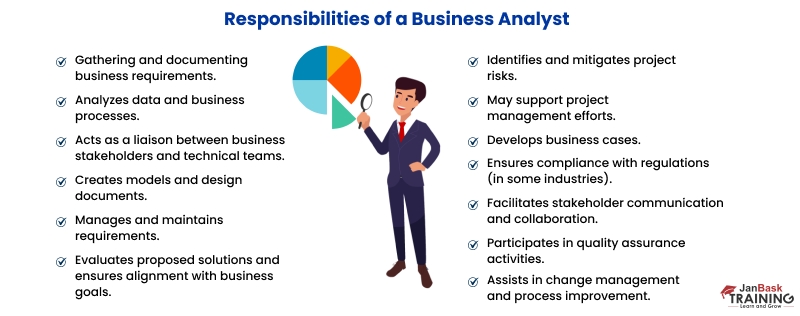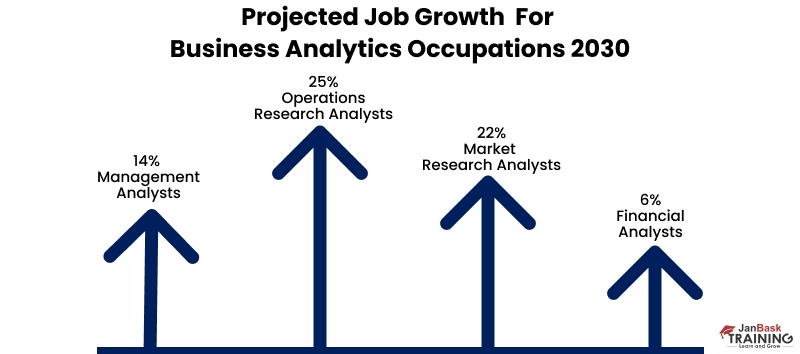Introduction
To embark on a career as a business analyst, it's essential to possess resume-worthy skills that are in high demand. The demand for certified business analysts is steadily increasing, with the U.S. Bureau of Labor Statistics projecting an 11% growth in employment from 2021 to 2031, surpassing many other occupations.
Yet, standing out in a competitive field requires more than just aspirations. Acquiring specific technical skills is crucial to enhance your candidacy and establish a prosperous career path as a business analyst. This blog aims to elucidate the most vital skills necessary for aspiring business analysts.
Enroll in a business analyst certification program to acquire these invaluable skills and bolster your resume!
What is a Business Analyst?
A Business Analyst (BA) is the bridge between a company's business needs and its technical solutions. They analyze how a business works, its goals, and any problems it faces. By examining data and talking to stakeholders, BAs identify areas for improvement and recommend solutions, often involving technology. They act as translators, explaining complex business needs to technical teams and ensuring new systems meet those needs. In short, BAs help businesses run smoother and achieve their goals. They achieve this by following these responsibilities:
- Identifying Business Needs: Business analysts uncover the specific needs and goals of a business through research and collaboration with stakeholders.
- Documenting Requirements: They meticulously document these needs in a clear and concise way.
- Analyzing Requirements: Once documented, business analysts analyze the requirements to ensure they are complete, consistent, and achievable.
- Facilitating Communication: Throughout the entire project lifecycle, business analysts act as communication hubs, ensuring clear and efficient information exchange among all stakeholders involved.
While the specifics of the role can vary depending on the company, industry, and project, these core responsibilities are central to the business analyst function.
Business Analyst Training & Certification
- Detailed Coverage
- Best-in-class Content
- Prepared by Industry leaders
- Latest Technology Covered
Technical Skills Needed For A Business Analyst
Thriving as a business analyst requires a well-rounded skillset. A strong grasp of your company's objectives is crucial for navigating complex situations and making informed recommendations. Here are some key competencies that will set you up for success:
1. Probability and Statistics
One fundamental technical business analyst skill is understanding statistics and probability. Methods of statistics and probability will aid business analysts in connecting the dots and coming to conclusions because their job is to identify answers from the data they have available. A business analyst will better understand the data and make accurate predictions using statistics and probability.
2. Programming Skills
Business analysts typically work with applicable coding and data. Being able to program is, therefore, a must-have business analyst skill. Business analysts benefit from using programming languages like Python and R to handle large data. Database management systems should be something that business analysts can work on as well. They can extract, generate, and edit data from databases using languages like SQL.
The programming languages and databases that are among the top business analyst skills required that business analyst must be familiar with:
- Python
- R
- Oracle
- MongoDB
- SQLite and MySQL
3. Data Visualization
To convert unprocessed data into digital representations that can be used for action, data visualization is one of the significant business analyst skills required. Business analysts may help clients understand the data and make strategic decisions to satisfy their needs by using their expertise in data visualization.
Business analysts employ many data visualization techniques, such as scatter plots, time series sequences, polar area diagrams, timelines, line graphs, and more. A business analyst must be skilled in using all these methods to create beautiful and thorough representations. These are some business analyst technical skills required for the job.
4. Documenting and Report Writing
This is one of the business analyst skills or technical expertise needed by business analysts. Writing reports, plans, paperwork, and different kinds of analysis details are all part of it. Writing on various subjects is a requirement of the job of a business analyst.
Understanding when to use technical jargon and when to write in simple, clear English is one of the secrets to producing reports effectively. This ability combines writing prowess with understanding the communication conditions, such as the target audience and the message you're attempting to express. One of the key abilities needed for a business analyst is written communication.
5. Data Analysis
The skills that will help business analysts to get insights from massive datasets and make data-driven recommendations are SQL, Excel, Tableau, Power BI, etc., and statistical analysis software (e.g., R, Python).
6. Business Intelligence (BI) Tools
Familiarity with tools like SAP BusinessObjects, IBM Cognos, or Microsoft Power BI, MSBI tools like SSIS, SSRS, and SSAS tools enables business analysts to prepare reports and interactive visualizations to provide required insights to the stakeholders.
7. Process Modeling
Business analysts use Business Process Models and Notation and process analysis tools like ARIS or Visio to map and analyze business processes, identify inefficiencies, and propose improvements.
8. Requirements Management
Business analysts manage requirements throughout the project lifecycle with tools like JIRA, Confluence, or IBM Rational DOORS.
9. Agile Methodologies
With necessary Agile skills, business analysts can collaborate with development teams, facilitate sprint planning, and participate in Agile ceremonies by understanding Agile methodologies like Scrum or Kanban.
10. Prototyping and Wireframing
Proficiency of Business Analysts in tools like Axure RP, Balsamiq, or Sketch to create interactive prototypes, wireframes, and mock-ups. These skills enable them to communicate requirements and validate solutions with stakeholders visually.
11. Knowledge of ERP and CRM Systems
Understanding resource planning systems like SAP or Oracle and (CRM) systems like Salesforce help business analysts gather requirements, evaluate integration needs, and support implementation projects.
12. Software Development Life Cycle (SDLC)
To work effectively with development teams and ensure smooth project execution, business analysts must have familiarity with the various phases of the SDLC.
13. Database and SQL
One of the many critical skills is the knowledge of databases and SQL. To store and process heavy data while working with structured data, they should have a decent knowledge of Microsoft SQL Server, MySQL database, Oracle DB, and NoSQL databases.
14. Microsoft Excel
To know about Microsoft Excel comes under a fundamental skill that every business analyst must have. Excel is one of the ancient and most used analytics and reporting tools; business analysts use it to perform several operations to unravel business patterns smoothly.
While correspondence, critical thinking, and basic reasoning abilities are central to being a decent BA, they are not the only required business analyst skills.
15. Cost-Benefit Analysis
Business analysts conduct cost-benefit analyses to assess the anticipated costs and benefits of a project. Before organizations undertake new initiatives, these analysts utilize cost-benefit analysis to determine their feasibility.
Non technical Skills Needed For A Business Analyst
With technical skills, one should have basic soft skills or non technical skills to flourish in their career. Adapt the following practices and give the best to your company by putting your best foot forward.

1. Relationship-Building Skills
Relationship-building is not among the technical skills of business analysts but is considered necessary. As a matter of first importance, the rundown of delicate aptitudes is the capacity to produce solid connections, frequently called partner connections. A partner is any individual who has something to add to your venture, and regularly, you'll work with numerous partners from both the business and the specialized groups.
2. Self-Managing
While BAs are not extended chiefs, the best BAs deal with the business investigation exertion. This implies the BA is proactive and reliant on mindfulness. It is a crucial point after the top business analyst's technical skills. It additionally implies they oversee themselves to responsibilities and due dates, a range of abilities which can include impact, assignment, and issue the executives.
3. Analytical and Critical Thinking
Business analysts evaluate numerous alternatives before helping a group settle on an answer. While finding the issue to be tackled, business investigators must tune in to partner needs, think about those requirements, and pose examining inquiries until the genuine need is surfaced and comprehended. This is the thing that makes basic reasoning and assessment aptitudes significant for new business investigators.
4. Communication and Interpersonal Skills
Regarding the top business analyst skills, Business Analysts must be great communicators. This implies they can encourage group meetings, pose relevant inquiries, hear the appropriate responses, and implement what's being said. In this day and age, correspondence does not generally happen eye to eye. The capacity to be a solid communicator in a virtual setting (using phone calls or web meetings) is similarly significant. As another business analyst, you might not have involvement in an assortment of business examiner determinations (that accompanies time and an assortment of venture encounters). Yet, it's very conceivable that your solid general documentation and composing aptitudes will kick you off.
5. Decision-Making Skills
A company business is directly and indirectly affected by the decisions taken by a business analyst. So they should be sure about their final decision after proper assessment and then present it. They should evaluate the solutions and their repercussions.
6. Teamwork
Business analysts frequently work as part of cross-functional groups. Being able to cooperate and work effectively with team members is essential.
7. Adaptability
Prerequisites and task requirements change now and then, so business analysts should be flexible and open to adjusting their strategy accordingly.
8. Negotiation Talents
This talent comes in handy to everyone, irrespective of their industry. Business analysts occasionally must adjudicate between stakeholders with competing interests, demanding firm negotiation talents.
9. Time Managing
Addressing numerous tasks and deadlines is a standard aspect of the role, so suitable time management is paramount to remain on top of responsibilities.
10. Business Acumen
A Business analysts should understand business regulations and approaches to align their analysis with the organization's objectives. A thriving business analyst possesses technical expertise and soft skills, enabling them to facilitate effective communication, drive projects forward, and contribute to the organization's overall success.
11. Critical Problem-Solving Skills
Last but not least, problem-solving efficiency is one of the significant business analyst skills required for business analyst. No task is without issues. Indeed, the whole task is an answer to an issue. At the most elevated amount, BAs encourage a mutual comprehension of the issue and the potential arrangements and decide the extent of the undertaking. You'll discover BAs amidst encouraging groups to settle specialized difficulties, mainly when they include arrangements between different businesses or specialized partners.
Growth And Salary Structure Of Business Analysts

Business analysts in the USA see a healthy salary range, with the average hovering around $83,000 to $90,000 annually. This can vary significantly based on experience, with entry-level analysts making closer to $69,000 and senior analysts reaching over $100,000. Location and industry also play a role, with tech hubs and certain sectors offering higher business analyst salaries.
| Profile |
Approx Salary |
|
Entry Level Business Systems Analyst
|
$56,043
|
|
Intermediate Level Business Systems Analyst
|
$63,335
|
|
Senior Business Systems Analyst
|
$1,05,998
|
|
Expert Business Systems Analyst
|
$137,320
|
|
Business Systems Analyst- Consultant
|
$102,825
|
|
Entry Level Business Analyst Salary
|
$54,272
|
|
Intermediate Level Business Data Analyst
|
$70,123
|
|
Senior Business Data Analyst
|
$87,713
|
|
Business Process Consultant
|
$106,234
|
|
Business Development Director
|
$196,235
|
Ace your career by landing a job in your dream company. Be prepared for any interview with top interview questions and answers for business analysts. You can stand out of the crowd with exceptional resumes if you are still worried about your chances. Write the perfect resume for your business analyst job and mark an impression on the employer or interviewer.
Business Analyst Training & Certification
- No cost for a Demo Class
- Industry Expert as your Trainer
- Available as per your schedule
- Customer Support Available
Conclusion
In essence, business analysts are the bridge between the business world and technology. They translate business needs into actionable plans, ensuring projects align with strategic goals. Business analyst is a dynamic career path offering ample opportunities for growth, intellectual challenge, and the satisfaction of driving positive change within an organization.
Frequently Asked Questions
Q1. What are the top technical business analyst skills?
Ans:- The ability to think critically, solve problems, and make decisions are three essential technical skills for the business analyst. Knowledge of the corporate world or the industry is a bonus, as are managerial abilities.
Q2. Why are technical business analyst skills important?
Ans:-Technical skills for business analyst is crucial because it gives them the resources they need to locate problems, analyze them, and find solutions. Business analysts examine current policies and systems, make recommendations, and work to improve procedures for individual departments or entire enterprises.
Q3. How do I learn business analyst skills?
Ans:- Here are some tips to help you learn business analyst skills:
- Learn business analysis fundamentals.
- Take an online data analytics course.
- Work on projects to develop your practical data analytics skills.
Q4. What will I learn in an online business analyst certification course?
Ans:-Build job-ready skills for an in-demand career as a Business Analyst with globally recognized Business Analyst Courses. JanBask Training courses enable students to learn the latest tools and methodologies that help them solve real-world problems.
- Learn to comprehend business problems and understand which solutions can maximize value to the organization.
- With our online business analyst tutorials, you develop critical thinking and analytical skills that enable you to prioritize business requirements.
- Gain Business decision-making, programming & negotiation skills by working on real-life project simulations.
Q5. What are the eligibility criteria for enrolling in a business analyst course?
Ans:- Here are some criteria for enrolling in a business analyst course.
- Aspiring business analysts, including recent college grads and those seeking to make a career shift.
- Individuals who have studied accounting, financial modeling, business, law & communications, or marketing in graduation.
- IT professionals, Project managers, Banking and finance professionals, and Sales professionals who want to advance in their careers.
Q8. Is Python among the key business analyst skills?
Ans:- Data analysts frequently use Python to classify recent data for business analytics. Additionally, they engage in exploratory data analysis, which entails profiling the data, visualizing the outcomes, and developing observations for the analysis's subsequent steps. It is also counted as one of the important technical skills for business analysts.
Q9. Is working as a business analyst tough?
Ans:- Yes, working as a business analyst may be challenging. Businesses can boost earnings and operational efficiency because of this. Business analysts employ data analytics, visualization, and modeling tools to make data-driven decisions.
Business Analyst Course
Upcoming Batches
Trending Courses
Cyber Security
- Introduction to cybersecurity
- Cryptography and Secure Communication
- Cloud Computing Architectural Framework
- Security Architectures and Models
Upcoming Class
1 day 30 Dec 2025
QA
- Introduction and Software Testing
- Software Test Life Cycle
- Automation Testing and API Testing
- Selenium framework development using Testing
Upcoming Class
-0 day 29 Dec 2025
Salesforce
- Salesforce Configuration Introduction
- Security & Automation Process
- Sales & Service Cloud
- Apex Programming, SOQL & SOSL
Upcoming Class
8 days 06 Jan 2026
Business Analyst
- BA & Stakeholders Overview
- BPMN, Requirement Elicitation
- BA Tools & Design Documents
- Enterprise Analysis, Agile & Scrum
Upcoming Class
11 days 09 Jan 2026
MS SQL Server
- Introduction & Database Query
- Programming, Indexes & System Functions
- SSIS Package Development Procedures
- SSRS Report Design
Upcoming Class
11 days 09 Jan 2026
Data Science
- Data Science Introduction
- Hadoop and Spark Overview
- Python & Intro to R Programming
- Machine Learning
Upcoming Class
4 days 02 Jan 2026
DevOps
- Intro to DevOps
- GIT and Maven
- Jenkins & Ansible
- Docker and Cloud Computing
Upcoming Class
4 days 02 Jan 2026
Hadoop
- Architecture, HDFS & MapReduce
- Unix Shell & Apache Pig Installation
- HIVE Installation & User-Defined Functions
- SQOOP & Hbase Installation
Upcoming Class
4 days 02 Jan 2026
Python
- Features of Python
- Python Editors and IDEs
- Data types and Variables
- Python File Operation
Upcoming Class
5 days 03 Jan 2026
Artificial Intelligence
- Components of AI
- Categories of Machine Learning
- Recurrent Neural Networks
- Recurrent Neural Networks
Upcoming Class
19 days 17 Jan 2026
Machine Learning
- Introduction to Machine Learning & Python
- Machine Learning: Supervised Learning
- Machine Learning: Unsupervised Learning
Upcoming Class
11 days 09 Jan 2026
Tableau
- Introduction to Tableau Desktop
- Data Transformation Methods
- Configuring tableau server
- Integration with R & Hadoop
Upcoming Class
-0 day 29 Dec 2025



























